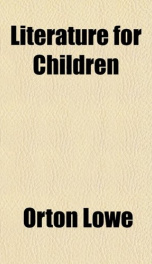literature for children

Purchase of this book includes free trial access to www.million-books.com where you can read more than a million books for free. This is an OCR edition with typos. Excerpt from book: CHAPTER II BOOKS AND LITERATURE IN ELEMENTARY SCHOOLS "He hath not fed of the dainties that are bred in a book; he hath not eat paper, as it were; he hath not drunk ink ; his intellect is not replenished ; he is only an animal, only sensible in the duller parts." Sib Nathaniel. The place of literature in the primary and grammar grades of schools needs neither a defence nor an apology. Being a part of that branch called reading, it is fundamental in the course. The claims set up by branches other than that of reading and speaking English do not concern us here. We assume that the first portion of time in a programme is allotted to this. The object may be dramatic expression in the lower grades, getting the exact thought from a printed page and reproducing it in the upper grades, drill in the mechanical details of the language, such as spelling and pronunciation; or it may be that rare growth of personality that comes, say, through the skilful reading of poetry aloud. Without a fair degree of mastery of the elements of reading and speaking English by the time he completes the grammar grade work, the boy will enter a secondary school or turn to earning a living, ill- equipped either to organize and express his ownthoughts, or to find profit and pleasure ingathering the thoughts of another from a printed page the greatest accomplishment that a school can give to any one. It is rather common to hear a high school student say that he cannot get the story by reading "The Lady of the Lake." This inability is a positive discredit to what should be normal mental vigour; and such a student will be found inefficient for the serious business of life or the refined pleasure of the fireside. Now it behooves teachers to put on their thinking caps and devise ways and means that ...
Info about the book
Author:
Series:
Unknown
ASIN:
B000IETDFG
Rating:
4.5/5 (2)Your rating:
0/5
Languge:
English
Users who have this book
Users who want this book
What readers are saying
What do you think? Write your own comment on this book!
write a commentif you like literature for children try:
Other books by this author
Do you want to exchange books? It’s EASY!
Get registered and find other users who want to give their favourite books to good hands!


